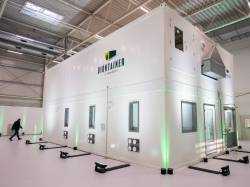Vaccine from the container
Biontech builds mobile factory for Africa
2/16/2022, 4:56 p.m
Compact and can be set up anywhere: The Mainz-based vaccine developers want to use container production facilities to advance the supply of vaccines in Africa. 50 million doses per year are possible with the “biotainers”. However, it is not a solution for now.
With mobile production facilities, the Mainz-based company Biontech wants to advance the production of corona vaccines in Africa. It presented the modules for such systems today in Marburg, Hesse. The Corona vaccine from Biontech and Pfizer is already being produced there on a large scale. Specifically, such a mobile production facility for mRNA vaccines consists of two modules, each comprising six containers, as Biontech explained. Both modules therefore require around 800 square meters of space and offer space for all the necessary equipment for the manufacturing process. Initially, a production capacity of up to 50 million doses of the Pfizer/Biontech vaccine per year is possible.
The “Biontainers” are also suitable for possible future vaccines against malaria or tuberculosis from Biontech, once they have been developed, approved and approved. The company also announced that it was planning to deliver the production facilities to Rwanda, Senegal and possibly South Africa in close coordination with the respective country and the African Union. The first system is scheduled to arrive in Africa in the second half of the year. Production is expected to start twelve months after delivery to destination. According to Biontech, partners in Ghana and South Africa could support production with filling and packaging capacities.
The presentation of the modules was attended by the Presidents of Rwanda, Ghana and Senegal – Paul Kagame, Nana Akufo-Addo and Macky Sall -, the Director General of the World Health Organization (WHO), Tedros Adhanom Ghebreyesus, and Federal Development Minister Svenja Schulze from the SPD. In a statement, Akufo-Addo spoke of a “meaningful day for Mother Africa”. Independent vaccine production should be achieved “to meet future national, regional and continental health security needs”. According to the announcement, EU Commission President Ursula von der Leyen called the Biontech initiative a “real pioneer in our global fight against the pandemic”. WHO Director-General Tedros welcomed Biontech’s initiative “to increase vaccine production in Africa” and “to complement the WHO hub” for mRNA technology transfer.
“Doctors Without Borders” takes Biontech plan too long
Kagame had been to Mainz the day before because Rhineland-Palatinate is a partner country of Rwanda. During the welcome in the Mainz State Chancellery, the Rhineland-Palatinate SPD Prime Minister Malu Dreyer spoke out in favor of global vaccination justice. “Access for all people to vaccines is central to a way out of the current pandemic,” she explained. Biontech initially wants to operate its container systems itself and staff it “to support the safe and rapid” start of production of the vaccines “while strictly adhering” to the guidelines. The knowledge should be passed on to local partners “to enable the independent operation of the production facilities”. Vaccines produced at the facilities are destined for domestic use and export to other African Union countries for a charitable price.
“Doctors Without Borders” also welcomed the steps towards the production of mRNA vaccines in African countries, but also expressed criticism. The company’s plan is taking too long, said the organization’s vaccine expert Lara Dovifat. “We don’t have that much time in the ongoing pandemic.” A study identified 120 pharmaceutical companies in the Global South that would be able to start producing mRNA vaccines within months if Biontech agreed to a technology transfer. Biontech had already announced in August last year that it wanted to examine the development and production of vaccines in Africa – specifically in Rwanda and Senegal. At that time, Biontech boss and co-founder Ugur Sahin said that the construction of the first production facilities should begin in the course of the next year – i.e. 2022.
